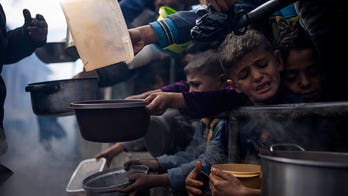Thousands of protesters took to the streets of Yerevan, the Armenian capital, on Thursday to demand Prime Minister Nikol Pashinyan's resignation. The demonstrations were sparked by the government's decision to hand over control of border villages to Azerbaijan, reigniting tensions between the two long-time rivals.

Yerevan, Armenia - Thousands of protesters gathered in the Armenian capital, Yerevan, on Thursday to demand the resignation of Prime Minister Nikol Pashinyan. The protests were sparked by the government's decision to hand over control of border villages to Azerbaijan, reigniting tensions between the two long-time rivals.

Armenia and Azerbaijan have fought two wars since the Soviet Union collapsed, and Armenia announced in April that it would return the villages to Azerbaijan. That decision came after Azerbaijan waged a lightning military campaign in Nagorno-Karabakh, a majority ethnic Armenian region inside Azerbaijan. The campaign forced tens of thousands of people to flee into Armenia, triggering demonstrations and calls for the prime minister's removal.
The protesters, led by a senior cleric in Armenia's church, walked approximately 100 miles from villages near the border with Azerbaijan to Yerevan, where they assembled in Republic Square on Thursday.
Videos shared on social media showed vast crowds waving Armenian flags. The senior cleric offered a prayer and gave Pashinyan one hour to resign, blaming him for the loss of Armenian territory.
Archbishop Bagrat Galstanyan urged the protesters to engage in "peaceful acts of disobedience" if Pashinyan did not heed their demands.
Pashinyan visited Moscow on Wednesday and held talks with Russian President Vladimir Putin amidst rising tensions between the strained allies. The meeting followed Putin's inauguration for his fifth term, which Pashinyan did not attend.
Putin's spokesperson, Dmitry Peskov, told Russian state news agency Tass that the two leaders had agreed to the removal of Russian forces from certain Armenian regions.
In brief remarks at the start of the talks, Putin acknowledged "some issues concerning security in the region" but noted that bilateral trade was increasing.
Pashinyan, who last visited Moscow in December, stated that "certain issues have piled up since then."
Armenia's relations with Russia, its long-standing sponsor and ally, have become increasingly strained since Azerbaijan's military campaign in Nagorno-Karabakh in September, which ended three decades of ethnic Armenian separatist rule.
Armenian authorities accused Russian peacekeepers deployed to Nagorno-Karabakh after the 2020 hostilities of failing to prevent Azerbaijan's offensive. Moscow, which maintains a military base in Armenia, rejected the allegations, claiming its troops lacked a mandate to intervene.
Meanwhile, the Kremlin has been irked by Pashinyan's efforts to strengthen ties with the West and distance Armenia from Moscow-dominated security and economic alliances.
While Pashinyan was in Moscow, Armenia's foreign ministry announced that the country would cease paying fees to the Russia-dominated Collective Security Treaty Organization. Armenia had previously suspended its participation in the grouping as Pashinyan sought closer ties with the European Union and NATO.
Russia was also displeased by Armenia's decision to join the International Criminal Court, which indicted Putin for alleged war crimes related to Russia's actions in Ukraine last year.
Moscow, preoccupied by the protracted Ukrainian conflict, has expressed concern about Armenia's westward shift but attempted to downplay the differences.
Kremlin spokesman Peskov acknowledged on Tuesday that "there are certain problems" in bilateral relations but emphasized the political will to continue dialogue.










